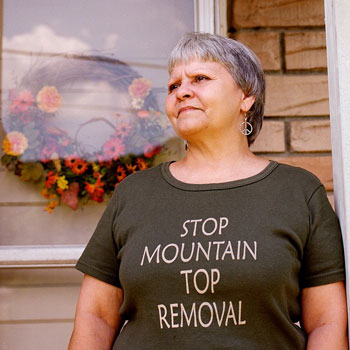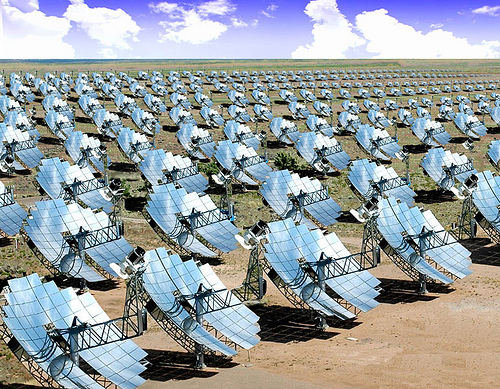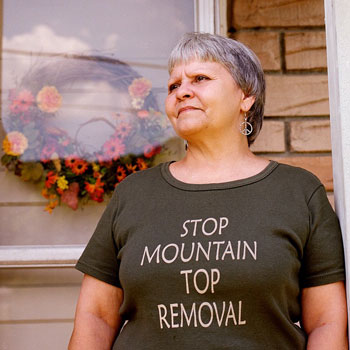 Judy Bonds.Photo: The Goldman Environmental PrizeI remember how people used to describe Judy Bonds. Ten years ago when I first started working to end mountaintop removal coal mining, Janice Nease, then the executive director of Coal River Mountain Watch, would always say that Judy marched into their office “like a linebacker,” ready to take on the coal companies that had destroyed the West Virginia hollow where her family had lived for nine generations.
Judy Bonds.Photo: The Goldman Environmental PrizeI remember how people used to describe Judy Bonds. Ten years ago when I first started working to end mountaintop removal coal mining, Janice Nease, then the executive director of Coal River Mountain Watch, would always say that Judy marched into their office “like a linebacker,” ready to take on the coal companies that had destroyed the West Virginia hollow where her family had lived for nine generations.
She was a force to be reckoned with, and she never looked back. In 2003, she won the Goldman Prize — often called the environmental Nobel Prize — and she went on to inspire thousands of people.
This morning, we all learned that Judy has died of cancer. Like thousands around the world, I was stunned to hear the news. Like many, I considered Judy a friend, mentor, and hero, and I can’t imagine the world without her. I grew up in the Smoky Mountains of East Tennessee, and I admired Judy’s unwavering devotion to Appalachia, her refusal to let our purple mountain(s) majesty become a sacrifice zone for the nation’s energy production.
When I was executive director of a grassroots group called Appalachia Voices that was working to end mountaintop removal, I turned to Judy for advice when the pressures of running a small nonprofit seemed unbearable. I remember calling her once as I was struggling with some tough character or another, and she said, “Look, this is hard work, and everybody says and does the wrong things sometimes. Just don’t let it bother you and let it go — like water off a duck’s back.” That advice from Judy has become a mantra for me.
Now that I have a baby of my own (an 11th generation West Virginian), I have a new appreciation of the story Judy would always tell about the moment when she became an activist. Most of the rest of her family had already moved out of Marfork Hollow due to the pollution and havoc wreaked by a nearby mountaintop removal operation, but she had stayed, until the day she found her grandson playing in a stream full of dead fish. From that moment on, Judy was a tireless and fearless activist, despite death threats, physical assaults, intimidation, an exhausting schedule, and the uncertainty of working for an organization that ran on a shoestring.
For Judy, the fight didn’t end with mountaintop removal — she understood that as long as the nation burned coal, Appalachia and all the other coal-producing regions of the nation would never be granted a reprieve. She had a more sophisticated understanding of politics and energy production than some of the most experienced lobbyists I’ve met in Washington.
She saw the poverty and environmental devastation in the Appalachian coalfields as living proof of the folly of trusting the coal industry’s promises. For those who haven’t been exposed to Judy’s wisdom, humor, and insight, author Jeff Biggers has pulled together some of her great quotes, articles, and videos in a tribute here.
When Judy was diagnosed with cancer, she told all of us, “We’ve got them on the ropes, so don’t let up for a second.” That is true not only of mountaintop removal, but also of coal’s stranglehold on energy production in this country. In the New Year, let’s all work even harder to end mountaintop removal, move America beyond coal, and lead this nation to a clean energy future. That is the best possible tribute we can make to Judy Bonds.
—–
Check out our Q&A with Bonds. She also made our list of 13 green badasses.
Please share your thoughts about Judy Bonds and her legacy in the comments section below.



